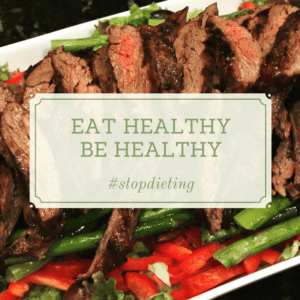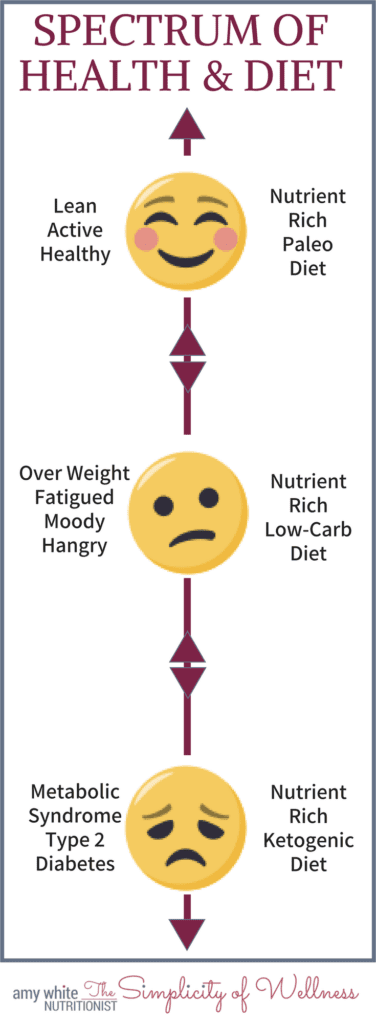Dieting
Dieting will not result in long-term, healthy weight loss. To me a diet has a start and an end point and because of this, diets are designed to fail. You make changes to hit a specific goal. You (hopefully) hit that goal and then what? You go right back to doing what you were doing before you started your diet and expect to remain healthy. You see how crazy that is, right? I mean, it’s obvious.
Somehow, I guess it isn’t that obvious because the average American repeats this diet cycle over and over. They hit their weight/health goals and the diet is magically over so they go back to eating their ‘normal’ food. The normal food that caused all the health and weight issues in the first place. Somehow, it’s expected that the normal food won’t have the same effect the next time around. But, of course it does and everyone is stunned, speechless and has no idea what happened.
We all know the famous quote, “The definition of insanity is doing the same thing over and over and expecting a different result.” Truer words could not be spoken when it comes to dieting.
Lifestyle
 What I promote to my clients, on my blog and on my facebook page is not a diet, it’s a lifestyle, a way of eating and living. There is no end point. You don’t hit a finish line and then go back to what you were doing before you made healthy changes.
What I promote to my clients, on my blog and on my facebook page is not a diet, it’s a lifestyle, a way of eating and living. There is no end point. You don’t hit a finish line and then go back to what you were doing before you made healthy changes.
If you’re looking at lifestyle change through a traditional diet lens I can see how those changes could seem unrealistic and depressing. You’d be looking at a life of bland, tasteless food and always being hungry. I agree, that would NOT be sustainable or fun.
Depriving yourself is NOT sustainable. You would be fighting mother nature and you would lose, every time (see the section above on diet ; ).
You need to feed your body. If you starve your body (traditional diet) you will feel horrible. You will crave food, you will dream about food. Your body will try every trick in the book to get you to eat. It has to, the bodies primary job is to keep you alive and food keeps you alive. You need food!
Diet vs. Lifestyle
A diet is all about deprivation, cutting calories and removing tasty food. This is not sustainable. For two reason:
1) You’re most likely a sugar burner. Your body runs on sugar. It has no other fuel source.
2) As you lose weight on a low-calorie, traditional diet you reduce your basil metabolic rate – the rate at which you burn calories while just sitting still. Let’s dig into these topics a little more.
Sugar Burner
You may be thinking, of course I’m a sugar burner, that’s the primary fuel source for the body. True but partial and not surprising that most people think this. There’s an article in Biochemistry and Molecular Biology Education from July 2013 (see article here) that discusses the misconception about body fuel as “a consequence of formal teaching in grade and high schools.” We are taught, in school that sugar is the bodies primary source of fuel. Ugh.
Yes, the body can and will use sugar as fuel. It’s an easy fuel, especially with our modern diet. My feeling is, the body, as a super sophisticated organism will ALWAYS follow the path of least resistance. If we’re going to feed our body gobs of sugars then our body will happily burn those sugars.
Here’s the thing, sugar is a fuel source but it is NOT the only fuel source. Fat is also a fuel source. The body will burn sugar before it burns fat. Guess what else is a fuel source, alcohol. If you’re thinking that sugar is the primary and most important fuel source because the body burns that before fat think again. The body will burn alcohol before it burns sugar. I think we can all agree that no one would consider alcohol the preferred fuel source.
The body burns what it can’t store. We have very little to no capacity to store alcohol so that has to go first. We also have very little storage for sugar so that goes next. What we do have extensive storage for is fat which is why fat will be the last thing the body will burn and only in the absence of both alcohol and sugar.
Have you been wondering if drinking alcohol will slow down your weight loss efforts? The answer is yes. If your body is humming along burning fat and then you throw alcohol into the mix, fat burning stops until all the alcohol is burned off. Same goes for sugar, sugar will stop fat burning.
I’ll get into the idea of sugar burning vs. fat burning in another upcoming post. For now, please understand, if you are eating a modern American diet. A diet high in carbohydrates, a.k.a. sugars you are a sugar burner. If you are carrying excess weight, especially around your waist you probably also have high levels of insulin, an imbalance of metabolic hormones. This combination will not allow you to burn body fat. You are running on one fuel, sugar.
As a sugar burner, you will need to eat at regular intervals, every couple of hours. Your body will need carbs and will crave sweet things. So, when you go on a diet and cut the amount of food (calories) you’re eating and cut the highly palatable foods – ice cream, pizza, pasta, bagels, you WILL feel deprived, hangry, moody, all of it. Your body will be starving for fuel and you’ll feel it.
The solution, re-training your body to burn fat.
Basil Metabolic Rate (BMR)
The second point I made about diets not being sustainable had to do with a reduction in basil metabolic rate. Again, this is the average amount of calories your body burns at rest. We all want to be burning calories while we’re watching T.V. so this is not something you want to decrease.
I like Dr. Jason Fung’s explanation of reduced metabolic rate when cutting calories, or basically, traditional dieting. He says,
“…if you reduce your Calories In, your Calories Out will automatically drop. This makes sense. If your body normally eats 2000 calories per day and burns 2000 calories, then what happens when you only eat 1200 calories? …If we are eating 1200 calories, we automatically adjust by burning 1200 calories. The body does not want to die…”
Your basal metabolic rate slows to conserve energy. This is the whole idea of “starvation mode”. When you cut calories (simulating a famine), and your body does not have access to stored fuel (fat) because you are a sugar burner, you will go into starvation mode. Your body thinks you are going to starve due to lack of food (fuel). For this reason your body will require you to be VERY still. It doesn’t want you to burn any calories, you must conserve every ounce of energy (calories) to stay alive. You can read more about this from Dr. Fung here.
Low-calorie dieting is different than fasting. I’ll elaborate on the difference in a future post. Low-calorie dieting is bad, fasting can be good. One gives your body a little food, just enough so that it thinks – if I don’t move and conserve every ounce of fuel maybe we’ll make it through the famine (no food to hunt or find). The other, fasting, causes metabolic hormone shifts that actually give your body energy and allow it to access stored body fat for fuel. If you look at this through an evolutionary lens, fasting allows your body to access stored fuel (fat) so you have the energy and strength to go find/hunt food. If that wasn’t the case our species would have died out long ago.
The key to long-term weight loss is keeping your basal metabolic rate high (calorie burning high). You don’t want your body thinking there’s a famine where food is available but scarce. In this case, the body cuts your normal level of calorie burn to conserve energy and keep you alive.
I’m sure you’re getting frustrated, what gives, right? How do we keep our BMR high? It’s all about shifting fuel sources. You have to allow your body access stored body fat for fuel. There are a few things that have to happen:
1) You have to get rid of the sugar. If there is sugar the body will not dig deep for stored fat. You can learn more about how to stop eating sugar here.
2) Metabolic hormone changes need to happen. I’m specifically talking about insulin levels but also other metabolic hormones.
Ketogenic & Low-Carb Living

This brings me, finally, to the Ketogenic Diet or in many cases just a regular, old school, low-carb diet. I use the word diet, to mean way of eating. Going forward I will try not to use the word diet and will refer to both keto and low-carb as lifestyles. A well formulated ketogenic lifestyle and a low-carb lifestyle will cut the sugars from your food. This will induce metabolic hormone changes that allow your body to access stored fat for fuel so it never goes into starvation mode. In other words, no fear of starvation, no need to conserve energy, no reduction in basal metabolic rate (calories burned while watching T.V.).
The most important thing about this approach to weight loss and health is, you will not be hungry and you will not feel deprived. You will eat, not diet.
A ketogenic lifestyle is a sub-category of a low-carb lifestyle. Being ketogenic is basically reducing the carbohydrates (sugars) in your food to a level that allows your liver to produce ketone bodies. Ketone bodies are yet another fuel source derived from fats. I will talk more about this in my next blog post.
One thing I would like to make clear, not everyone needs to or should “go keto”. Low-carb living is great and can help many regain their health and optimal weight. There are reasons to dive into keto vs. just going low-carb and I’ll outline some of those reason in the next post. For now, let’s go back to my spectrum of health with the metabolically healthy, lean, athletes at one end and those suffering with metabolic syndrome and type 2 diabetes at the other end. The ketogenic diet/lifestyle will be at the metabolic syndrome end. The eating styles I like to use on my spectrum of health are paleo to ketogenic with low-carb floating in the middle.
Where you fall on the spectrum of health will help determine which lifestyle might suit you the best. Watch for my next blog post where I discuss more about the difference between a ketogenic lifestyle and a low-carb lifestyle and why one may be better for you than the other.
Watch for the rest of the July posts about how to enjoy a ketogenic lifestyle. Learn what to eat and how to eat so you don’t feel hungry or deprived. Get ready to embrace and enjoy healthy, nourishing foods so you can regain your health, energy and a healthy weight.
To learn more about the delicious food you can enjoy while living a low-carb or ketogenic diet lifestyle please download my free guide: 3 Key Tips on How To Eat Low-Carb: Burn Body Fat, Lose Weight and Increase Energy (formally the free guide, How To Lose Belly Fat). If you’ve already downloaded the ‘How To Lose Belly Fat’ guide please just review, no need to download this new version.
Be well,


I’m Amy a board certified holistic nutritionist, certified functional nutritionist and lifestyle practitioner and certified Life Coach. I help women in midlife understand the changing needs of their body so that they can stop dieting and lose weight permanently. At 56 I live what I teach. Don’t believe the story that your best years are behind you. They are not. Your best years are just starting!
